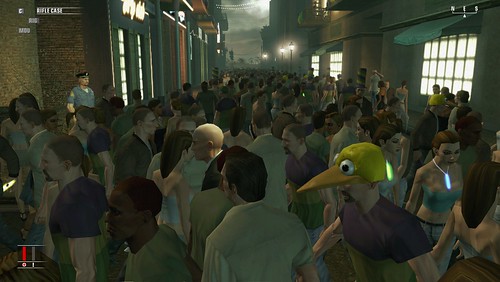The name "Horde" implies that this engine was made for scenes with a lot of characters on screen. That is exactly what I need for my project. Let's say I want to render this (the game is called Hitman Bloodmoney from 2006):

There are about 10 distinctive models, repeated randomly to create that crowd. Notice how some models are recycled - for example that guy with the yellow birdhat also walks around without the hat or has a slightly differently colored skin in another case.
Let's say they average to about 5000 low poly characters on screen at a time with about 50 unique model combinations (different skins, different hats) in total. If I create a similar scene in Horde3D (based on the chicago demo), I get really horrible performance since no batching takes place. What can I do to speed things up and render a huge crowd in realtime, just like that 2006 game does without breaking a sweat?
- How do I batch all models into 1 rendercall?
- How do I efficiently batch differently textured models (or ones with a hat) into that same rendercall?
- What are realistic figures that you would expect Horde3D to render this way? Are 5000 objects simply too much for this engine?
PS: I notice there is batching going on in the particle engine - maybe that can be used for this? My models need individual shadows etc. though.
